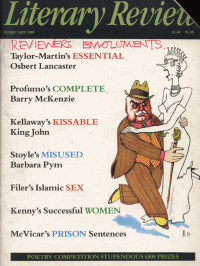Steve Race
A Loos Woman
Anita Loos: A Biography
By Gary Carey
Bloomsbury 331pp £14.95
The shocking autobiography of a 1925 bimbo cheered the wartime nights for Winston Churchill, delighted H G Wells, Lytton Strachey, James Joyce, the Prince of Wales, William Faulkner, Aldous Huxley, Mussolini and Santayana. Edith Wharton described it as ‘the great American novel at last’. Scott Fitzgerald didn’t like it, and underlined the fact by once trying to murder its authoress. A staggering success, Gentlemen Prefer Blondes was translated into fourteen languages, including Russian – they took it seriously as an indictment of capitalistic decline. There was even a version for what the editor of the Review cheerfully calls ‘the poor, mad Japanese’.
On examination Anita Loo’s masterpiece turns out to contain no explicit sex at all, which must have disappointed the Japanese, although there are plenty of flabby middle-aged businessmen who, having taken a girl to dinner and a show, are reminded next morning to buy her a diamond bracelet at Tiffany’s.

Sign Up to our newsletter
Receive free articles, highlights from the archive, news, details of prizes, and much more.@Lit_Review
Follow Literary Review on Twitter
Twitter Feed
'A charming and amusing personal history'
Don't miss this brilliant @Lit_Review review of #WorldCupFever 👇
@KuperSimon's must-read footballing journey in nine tournaments is out now ⚽️🏆
Michael Taylor - The Beautiful Game
Michael Taylor: The Beautiful Game - World Cup Fever: A Footballing Journey in Nine Tournaments by Simon Kuper; Th...
literaryreview.co.uk
In the summer of 1918, the Caspian port of Baku played host to a remarkable group of Allied soldiers, sent to defend oil wells against the Ottomans.
Anna Reid recounts their escapades.
Anna Reid - Mission Impossible
Anna Reid: Mission Impossible - Mavericks: Empire, Oil, Revolution and the Forgotten Battle of World War One by Nick Higham
literaryreview.co.uk
Alfred, Lord Tennyson is practically a byword for old-fashioned Victorian grandeur, rarely pictured without a cravat and a serious beard.
Seamus Perry tries to picture him as a younger man.
Seamus Perry - Before the Beard
Seamus Perry: Before the Beard - The Boundless Deep: Young Tennyson, Science, and the Crisis of Belief by Richard Holmes
literaryreview.co.uk